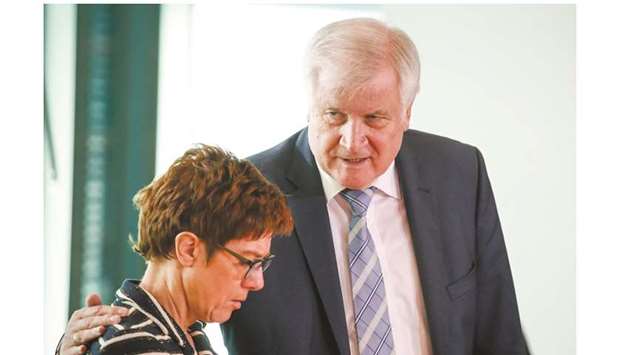German Interior Minister Horst Seehofer has lashed out at critics of migrant sea rescues in the Mediterranean, and added that Italy’s new government could present a renewed chance for an EU-wide deal on how to deal with migration.
“It is incredible that, as interior minister, one should have to justify the rescue of people from drowning,” Seehofer told reporters, confirming that Germany was offering to take around one-quarter of all migrants rescued at sea.
He was speaking ahead of a summit on Monday in Malta, where EU officials are hoping to reach a deal on how to manage rescues off the coast of EU members Italy and Malta.
Seehofer said he favoured a “flexible solidarity” deal that would not necessarily include all 27 members of the European Union (excluding Britain).
“If we wait for all 27 to participate, then we will never get a solution,” he said, adding that Italy’s new government – without anti-migration League party leader Matteo Salvini – offered a “new era” and an opportunity for compromise over migration.
“If Germany does not take this major opportunity, that would be a major failure. We must take this chance,” Seehofer said, adding that he had had constructive conversations on Wednesday evening with Italy’s new interior minister.
German President Frank-Walter Steinmeier, who was in Rome yesterday, said that Europe needed to find ways to show solidarity with Italy and reduce its burden in the current crisis.
“The central issue in our view is that the rest of Europe does not leave Italy alone with this task,” Steinmeier said after meeting with his Italian counterpart Sergio Mattarella, who said he welcomed Germany’s willingness to take in refugees.
While supporting a settlement for sea rescues, Seehofer rejected the notion that he was reversing course after being one of Germany’s more outspoken critics of Chancellor Angela Merkel’s open migration policy back in 2015.
Seehofer, a member of the conservative Christian Social Union (CSU), stressed the “entirely different dimensions” when it comes to Mediterranean rescues and said that Germany needed to strike a balance between its “humanitarian” responsibilities and the need for “order”.
He noted that Germany had agreed to accept 565 migrants rescued at sea since the start of the year – of which only 225 have actually arrived in Germany to date – compared to 95,000 that have sought refuge in Germany overall in 2019.
Taking in such a small number of sea rescues was “light years away” from signalling a broader change in Germany’s migration policy, Seehofer stressed.
By contrast, he sounded a warning about developments in Greece and Turkey, which has threatened to allow more refugees from Syria to pass through its own country and reach Europe’s borders if a new aid deal with the EU is not agreed.
“This is the major challenge that we have to deal with,” Seehofer said, noting that the dimensions here were far greater than the sea rescues and adding that he planned to travel to Greece and Turkey in October for discussions on the crisis.
He noted that 791 migrants had reached the Greek islands on Wednesday alone.
Germany accepted more than 1mn refugees in 2015 and 2016, but the annual numbers have fallen back since.
Seehofer himself led efforts to introduce an annual quota on refugees accepted into Germany each year.

Seehofer: We shouldn’t have to justify migrant sea rescues
